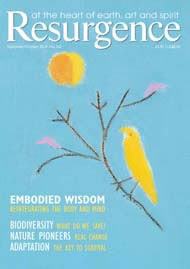This is a work of the combined efforts of the celebrated Brazilian liberation theologian Leonardo Boff and the Canadian educator and social activist Mark Hathaway. It starts with a foreword by the ecological thinker and social activist Fritjof Capra, who gives it a glowing endorsement, and combined with this foreword are the enthusiastic testimonies of other major ecological thinkers: Brian Swimme, Matthew Fox and Mary Evelyn Tucker, to name a few. And after reading this book, I can add my own strong endorsement of what is a very powerful work which, in the depth and range of the topics it explores, shows a virtuosity and deftness in what I would call integral transformative learning.
The opening prologue starts with the following sentence: “The Tao of Liberation is a search for wisdom, the wisdom needed to effect a profound transformation in our world.” Although this work draws inspiration from the Tao Te Ching, it is not in any way a text on Taoism.
Each chapter begins with an evocative quote from the Tao to set the ambience for the material that follows. The work creatively holds many diverse areas in an integral manner covering, with a commanding scholarship, such fields as economics, psychology, cosmology, ecology and spirituality. It also displays a strenuous commitment to issues of social justice combined with a path-breaking reflection on sustainability in a larger evolutionary context, exploring the work of Thomas Berry and Brian Swimme in the context of cosmology. This complex weave opens up a view of evolutionary transformation that brings to the fore the intense importance of spirituality as the creative dynamism for social and planetary change.
In the opening prologue, the crisis of the Earth is seen in the context of cosmic time, and the authors explore the meaning of the Ecology of Transformation. The work then moves on and is divided into three parts. Part I bears the title Exploring the Obstacles. The themes within this section are threefold: the first is Unmasking a Pathological System, the second is Beyond Domination and the third is named Overcoming Paralysis. Part II is entitled Cosmology and Liberation and develops themes including Rediscovering Cosmology; Complexity, Chaos and Creativity; Memory, Morphic Resonance, and Emergence; and The Cosmos as Revelation. Finally, Part III, entitled The Tao of Liberation, features the themes of Spirituality for an Ecozoic Era and The Ecology of Transformation.
Of the many highlights I could elaborate on, I shall concentrate on the two that impressed me most. The first is a reflection on the Earth Charter, which is a document that provides a radical shift in perspective and gives a set of foundational principles that deals with the planetary crisis of our times. The World Secretariat on the Earth Charter Initiative is presently trying to coordinate a programme to bring the Earth Charter to the attention of educators around the globe. The book articulates a fundamental role that the Earth Charter can play in formulating and deepening the concept of the ecology of liberation that the authors of this work espouse.
The second is the exploration of spirituality in what Thomas Berry calls the Ecozoic Era. In the final section of this book there is a very pointed discussion on spirituality in the context of ecological transformation. Both authors come from a Christian background, and so it includes an extended reflection on Christianity and its possibilities in this transformative moment in history. That said, the book is not restrictive and really does address the multifaceted spiritualities that we experience in our lives.






